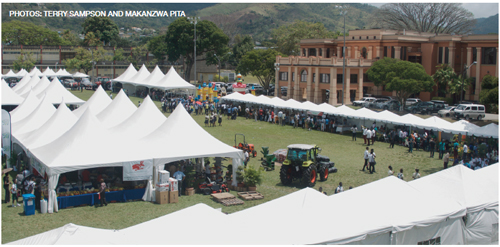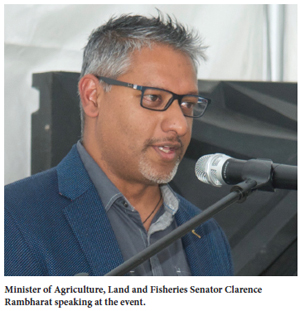 |
 |
 |
|
April 2017
|
Lower down, booths tempt visitors with specialty chocolates made from Trinidad cocoa, pickles, condiments and wines derived from exotic fruits and vegetables. For gluten sensitive foodies, there is flour from sweet potato, cassava, eddoes, and banana. A cornucopia of plant-based products, some familiar, some completely surprising, beguile visitors – animated children, inquisitive teens and discerning adults alike. These and many more agri-based products took centre stage at the three-day exhibition “TechAGRI Expo 2017: Innovation, Entrepreneurship and Commercialisation” held in March, the brainchild of the Faculty of Food and Agriculture. “The reason for this exhibition is to raise the profile of agriculture in Trinidad and Tobago and of the Faculty of Food and Agriculture as the custodian for agricultural learning, research and technology in the region,” explained Dr. Wayne Ganpat, Dean of the Faculty of Food and Agriculture. He added that there are “secondary objectives” such as getting young people interested in agriculture, getting them to pursue a programme at the Faculty, as well as connecting product developers to potential investors/business partners so that their goods can be further commercialised. Over the three days of the expo, visitors explored the work being done in agriculture and food throughout the nation, discovering agri-innovations, unique food-based product applications, and the services of entrepreneurs and organisations in the sector.
A major setback to developing the sector is its image problem. Food production is associated with back-breaking work, often in unforgiveable natural conditions, tainted by the legacies of slavery and indentureship. Its financial returns can also be comparatively low compared to other sectors. While some only see these challenges, others see the opportunities that abound. Dr. Ganpat, for instance, believes the field is wide open for technology-driven innovation, from growing to productivity to processing to marketing. Indeed such was the buzz generated around techAGRI 2017 that capacity constraints forced the organisers to stop further registration of secondary schools seeking to attend on the opening day. Coming from as far as Moruga, Cedros, Matelot and Tobago, an estimated 2,000 students thronged the West Field exhibition area, among the first visitors to delight in the scents and sights of an exotic range of locally-commercialised agricultural goods. After foraging the exhibition booths, students were treated to demonstrations of technology in action. Throughout the day, they were taken in groups on tours of the labs and work spaces of the Faculty of Food and Agriculture to explore, among other things, the science and practice of aquaponics, hydroponics, tissue culture, vermin-culture, composting, grow rooms, chocolate making and the National Herbarium. “We’re trying to show them the science behind agriculture,” Dr Ganpat explained. “We want them to see that it is possible to work in agriculture smartly and make a successful career out of it.” In a sense, TechAGRI represents the convergence of academic research and commerce to fulfill economic wants and needs via innovative applications of home-grown agriculture products. Applying new technologies can make agriculture sexier, increase farming and investment in the sector and contribute to a more diversified economy. For decades, the trend in agriculture has been a steadily declining contribution to national Gross Domestic Product (GDP), with the dollar value of agricultural output standing at just 0.3% currently.
The pervasive attitude towards agriculture is overwhelmingly negative. While the demand for agricultural products continues to escalate, young people are not attracted into a profession considered to be “uncool”. “As a result, most people involved in agriculture are aged. The elderly dominate the sector because they grew up in it but their offspring are not being attracted into farming,” Dr. Ganpat said. “My vision is to change this image into something more interesting. Everyone would benefit from that. We want to see increased enrolment in the Faculty of Agriculture where we offer programmes in Food and Nutrition, Geography, Environmental Studies… the entire eco-system of agriculture.” Globally, agriculture is a multi-billion dollar industry, with thriving sectors in many developed economies, particularly the European Union and the United States. Those economies have the advantage of being heavily subsidised by their governments, keeping production costs down. They also have the advantage of being early adopters of agri-technology. “They’ve learned that larger land spaces are not mandatory as farmers can use more technology to increase their efficiency and quality. You don’t need a lot of land when you can produce crops just as successfully in a room under lights 24 hours a day,” the Dean said. “They are extensive purveyors of organic farming and vertigrow systems. There is greater emphasis on safer, more organic and natural products.” Beauty bars and coffee beans It’s Friday evening on the opening day of the Expo, and the sun is dipping in the West; the tents housing exhibitors have gone soft from earlier rainfall; the clouds have lifted, exposing a crisp freshness in the air. The rush of students had ebbed and a different crowd streams in; a constant flow of after-work patrons. They are blasted by the aromas – sweet, medicinal, balmy, fruity, earthy – finding them just as intoxicating as the earlier visitors. Just next to one of the booths selling luxury handmade soaps, something else tickles the nose – a single earthy aroma providing a refreshing escape from the olfactory bombardment – home roasted, 100% Trinidad coffee beans and grounds. “One thing I really want to see is greater awareness of local coffee in Trinidad because a lot of people did not think that we had really good coffee,” Floyd Homer, founder of Café Vega told UWI Today in between questions from curious visitors. He said many Trinidadians misguidedly believed Blue Mountain coffee to be the Gold Standard. Most have not had coffee roasted professionally in Trinidad from the different local varieties. They are unaware of the quality that exists. His Café Vega line is derived from a single bean, or a single variety from a single location. Most supermarket brands are “bulked” coffees, sourced from different locations. The difference with a single bean is a consistent roast and flavour across different batches. “I want to make more people aware of what we have right here,” Homer said. “I hope people are prepared to support coffee production and expand it, and rebuild a coffee industry for Trinidad and Tobago.”
Homer’s coffees were previously available through word of mouth only but he seized the TechAGRI expo to launch the Café Vega brand to the national community. Throughout the exhibition, he said he’s received expressions of interest from several persons with boutique shops and cafes who were interested in representing his brand or using it in their shops. “Some people even expressed interest in learning about growing coffee to get into the supply side of the business and a few others had an interest in setting up their own roastery and trying to do coffee of their own. I encouraged everyone. There is room, the market is big enough for everybody,” he said. Many of the entrepreneurs appear to share this magnanimous view. They implicitly understand that they are involved in something bigger than themselves. Joanne Raymond of AL Organic, maker of a range of organic based beauty bars, said the sales and brand awareness arising from TechAGRI were not the primary reasons for participating. “We always looked at it as ‘great we can sell and people will become aware of the products’, but beyond that it’s really good for young entrepreneurs to realise you can think outside of the box and actually make an added value based product and maybe form a small company and start commercial distribution. That’s where we started and that entrepreneurial spirit is what we want to spread among our visitors.” In similar vein, Ganpat’s end goal is not simply boosting student enrolment in the Faculty of Food and Agriculture, but rather national development. “The Government and the Ministry of Agriculture must be the leaders but we at the Faculty have to be a major player. Our role is human resource development and research. We have a very active research programme, and with the right direction we can make a significant contribution to national food production and development.” Tied to that objective is the creation of a food secure nation, against a backdrop of dwindling food production, foreign exchange constraints and dependency on external sources for basic food items. He questioned what would occur in the event of an outbreak of disease that affects livestock or wheat crops in the US. “Would we stop eating bread and roti? Climate change is happening, global politics are uncertain; the time has come for us to be able to stand on our own.” Ganpat cited the example of domestic milk production as an exemplary model employing hundreds of tiny farmers in a highly-organised collection system. “If everyone produced a basic amount of food and we organised some sort of system to collect it we’d go a long way in creating food security,” he concluded.
Sherry Ann Singh is a freelance writer. |


 Mouth-watering fragrances perfume the air across the temporary village of white tents erected on the field west of UWI’s Main Administration Building, St. Augustine. A brisk wind disperses the scents of avocado, cinnamon, nutmeg, guava, coconut, mango, pumpkin and yes, chocolate. You’d be forgiven for mistaking this for a culinary feast; the lingering aromas are instead all from luxurious, organically crafted, food-based bath soaps, all made by hand in Trinidad and Tobago.
Mouth-watering fragrances perfume the air across the temporary village of white tents erected on the field west of UWI’s Main Administration Building, St. Augustine. A brisk wind disperses the scents of avocado, cinnamon, nutmeg, guava, coconut, mango, pumpkin and yes, chocolate. You’d be forgiven for mistaking this for a culinary feast; the lingering aromas are instead all from luxurious, organically crafted, food-based bath soaps, all made by hand in Trinidad and Tobago. Dr. Ganpat views TechAGRI as part of his wider mission to revitalise the once vibrant Faculty of Agriculture he took over in 2016, restoring it to its former position as the centre for agriculture research and learning in the region, while contributing to national development through progressive food production techniques.
Dr. Ganpat views TechAGRI as part of his wider mission to revitalise the once vibrant Faculty of Agriculture he took over in 2016, restoring it to its former position as the centre for agriculture research and learning in the region, while contributing to national development through progressive food production techniques.

